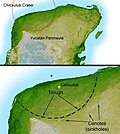The Cretaceous–Paleogene (K–Pg) extinction event, also known as the K–T extinction, was the mass extinction of three-quarters of the plant and animal...
196 KB (21,558 words) - 07:19, 20 December 2024
amount of research has been conducted on the Cretaceous–Paleogene extinction event, the mass extinction that ended the dinosaur-dominated Mesozoic Era...
120 KB (12,560 words) - 14:02, 2 September 2024
043 Ma. The K–Pg boundary is associated with the Cretaceous–Paleogene extinction event, a mass extinction which destroyed a majority of the world's Mesozoic...
30 KB (3,131 words) - 01:53, 23 December 2024
early Paleogene, as survivors of the Cretaceous–Paleogene extinction event took advantage of empty ecological niches left behind by the extinction of the...
68 KB (7,533 words) - 15:12, 19 December 2024
Cretaceous (along with the Mesozoic) ended with the Cretaceous–Paleogene extinction event, a large mass extinction in which many groups, including non-avian dinosaurs...
96 KB (9,932 words) - 15:05, 19 December 2024
impact 66 million years ago, believed to be the cause of the Cretaceous–Paleogene extinction event. Small objects frequently collide with Earth. There is an...
108 KB (12,243 words) - 23:51, 17 December 2024
mass extinctions have significantly exceeded the background extinction rate. The most recent and best-known, the Cretaceous–Paleogene extinction event, which...
147 KB (15,031 words) - 05:14, 17 November 2024
willows could be found in abundance. The Cretaceous–Paleogene extinction event was a large-scale mass extinction of animal and plant species in a geologically...
18 KB (1,711 words) - 15:00, 13 December 2024
the Cretaceous–Paleogene boundary (K–Pg or formerly the K–T boundary) is very important to geologic time as it marks a catastrophic global extinction event...
23 KB (3,148 words) - 03:35, 11 December 2024
This is a list of extinction events, both mass and minor: "Big Five" major extinction events (see graphic) Marine extinction intensity during Phanerozoic...
23 KB (1,854 words) - 01:50, 12 November 2024
Alvarez hypothesis (redirect from Alvarez extinction hypothesis)
posits that the mass extinction of the non-avian dinosaurs and many other living things during the Cretaceous–Paleogene extinction event was caused by the...
21 KB (2,437 words) - 21:32, 4 November 2024
was wiped out in the Cretaceous-Paleogene extinction event; only 3 extant tetrapod lineages can trace their ancestry to Cretaceous India. Most of India's...
26 KB (3,373 words) - 08:06, 30 May 2024
Mesozoic (section Cretaceous)
extinction event, the largest mass extinction in Earth's history, and ended with the Cretaceous–Paleogene extinction event, another mass extinction whose...
41 KB (4,342 words) - 15:09, 19 December 2024
impact event may have caused the Cretaceous–Paleogene extinction has led to speculation that similar impacts may have been the cause of other extinction events...
381 KB (40,791 words) - 17:51, 19 December 2024
Titanoboa (category Paleogene Colombia)
following the extinction of all non-avian dinosaurs, being one of the largest reptiles to evolve after the Cretaceous–Paleogene extinction event. Its vertebrae...
29 KB (3,251 words) - 17:24, 7 December 2024
Danian (section Latest Danian Event)
(and the end of the preceding Maastrichtian) is at the Cretaceous–Paleogene extinction event 66 Ma. The age ended 61.6 Ma, being followed by the Selandian...
14 KB (1,393 words) - 14:41, 13 December 2024
Maastrichtian (category Late Cretaceous)
province in the Netherlands. The Cretaceous–Paleogene extinction event (formerly known as the Cretaceous–Tertiary extinction event) occurred at the end of this...
20 KB (1,823 words) - 19:11, 17 December 2024
Chicxulub crater (category Cretaceous–Paleogene boundary)
resulting from the impact was the primary cause of the Cretaceous–Paleogene extinction event, a mass extinction of 75% of plant and animal species on Earth, including...
84 KB (8,255 words) - 08:19, 22 December 2024
extinction event as a result. It is classified as a minor extinction event, rather than a major event like the famous Cretaceous–Paleogene extinction...
2 KB (262 words) - 09:52, 6 March 2023
various neoavian groups occurred very rapidly around the Cretaceous–Paleogene extinction event, and attempts to resolve their relationships with each other...
39 KB (1,398 words) - 04:43, 17 December 2024
Impact winter (category Impact events)
winter could lead to mass extinction, wiping out many of the world's existing species. The Cretaceous–Paleogene extinction event probably involved an impact...
26 KB (3,166 words) - 12:06, 14 November 2024
impactor, an asteroid or comet which caused the Cretaceous–Paleogene extinction event, which led to the extinction of the non-avian dinosaurs, pterosaurs and...
7 KB (290 words) - 19:11, 7 December 2024
change (modern day) Climate change (general concept) Climate across Cretaceous–Paleogene boundary Thermal history of Earth Geologic temperature record Timeline...
7 KB (311 words) - 05:03, 15 April 2024
dinosaur such as Stenonychosaurus had not perished in the Cretaceous–Paleogene extinction event, its descendants might have evolved to fill the same ecological...
10 KB (1,186 words) - 15:09, 9 November 2024
Cretaceous-Paleogene boundary in the geological stratum that marks the Cretaceous–Paleogene extinction event and Purgatorius, sometimes considered a stem-primate, appears...
25 KB (2,521 words) - 02:12, 17 December 2024
Ammonoidea (category Paleocene extinctions)
with the last species vanishing during or soon after the Cretaceous–Paleogene extinction event. They are often called ammonites, which is most frequently...
52 KB (5,802 words) - 00:57, 23 December 2024
ecological impacts associated with the Permian–Triassic and Cretaceous–Paleogene extinction events. Furthermore, biotic recovery from LOME proceeded at a much...
102 KB (11,112 words) - 04:51, 11 November 2024
extinction events, the Late Devonian extinction, the Permian–Triassic extinction event, the Triassic–Jurassic extinction event, and the Cretaceous–Paleogene extinction...
267 KB (25,528 words) - 18:42, 13 December 2024
Ornithopoda (category Maastrichtian extinctions)
known as 'duck-bills'), before they were wiped out by the Cretaceous–Paleogene extinction event along with all other non-avian dinosaurs. Members are known...
18 KB (1,517 words) - 05:23, 3 December 2024





















